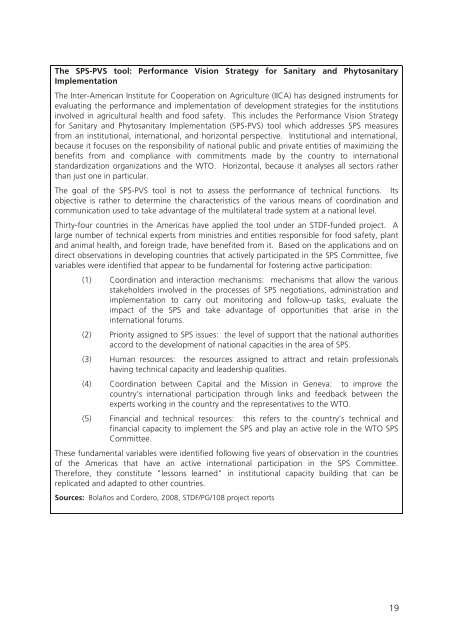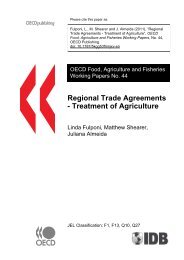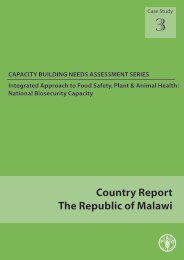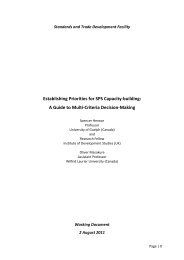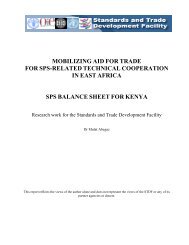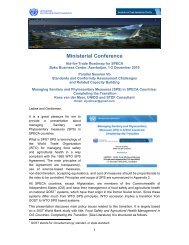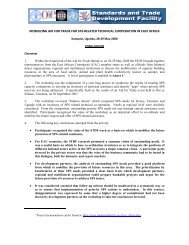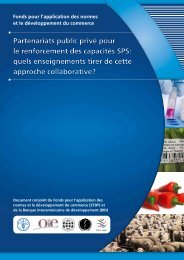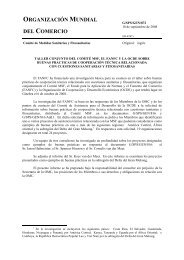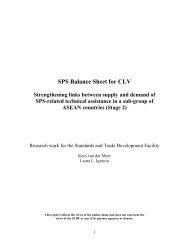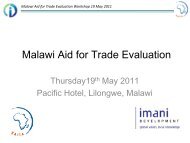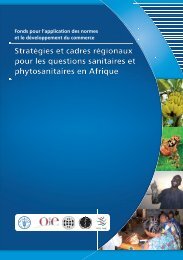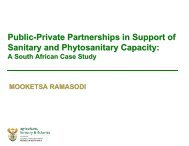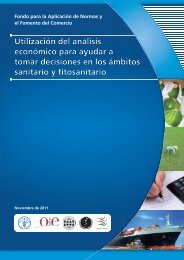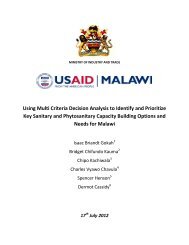National SpS Coordination Mechanisms - Standards and Trade ...
National SpS Coordination Mechanisms - Standards and Trade ...
National SpS Coordination Mechanisms - Standards and Trade ...
You also want an ePaper? Increase the reach of your titles
YUMPU automatically turns print PDFs into web optimized ePapers that Google loves.
The SPS-PVS tool: Performance Vision Strategy for Sanitary <strong>and</strong> PhytosanitaryImplementationThe Inter-American Institute for Cooperation on Agriculture (IICA) has designed instruments forevaluating the performance <strong>and</strong> implementation of development strategies for the institutionsinvolved in agricultural health <strong>and</strong> food safety. This includes the Performance Vision Strategyfor Sanitary <strong>and</strong> Phytosanitary Implementation (SPS-PVS) tool which addresses SPS measuresfrom an institutional, international, <strong>and</strong> horizontal perspective. Institutional <strong>and</strong> international,because it focuses on the responsibility of national public <strong>and</strong> private entities of maximizing thebenefits from <strong>and</strong> compliance with commitments made by the country to internationalst<strong>and</strong>ardization organizations <strong>and</strong> the WTO. Horizontal, because it analyses all sectors ratherthan just one in particular.The goal of the SPS-PVS tool is not to assess the performance of technical functions. Itsobjective is rather to determine the characteristics of the various means of coordination <strong>and</strong>communication used to take advantage of the multilateral trade system at a national level.Thirty-four countries in the Americas have applied the tool under an STDF-funded project. Alarge number of technical experts from ministries <strong>and</strong> entities responsible for food safety, plant<strong>and</strong> animal health, <strong>and</strong> foreign trade, have benefited from it. Based on the applications <strong>and</strong> ondirect observations in developing countries that actively participated in the SPS Committee, fivevariables were identified that appear to be fundamental for fostering active participation:(1) <strong>Coordination</strong> <strong>and</strong> interaction mechanisms: mechanisms that allow the variousstakeholders involved in the processes of SPS negotiations, administration <strong>and</strong>implementation to carry out monitoring <strong>and</strong> follow-up tasks, evaluate theimpact of the SPS <strong>and</strong> take advantage of opportunities that arise in theinternational forums.(2) Priority assigned to SPS issues: the level of support that the national authoritiesaccord to the development of national capacities in the area of SPS.(3) Human resources: the resources assigned to attract <strong>and</strong> retain professionalshaving technical capacity <strong>and</strong> leadership qualities.(4) <strong>Coordination</strong> between Capital <strong>and</strong> the Mission in Geneva: to improve thecountry's international participation through links <strong>and</strong> feedback between theexperts working in the country <strong>and</strong> the representatives to the WTO.(5) Financial <strong>and</strong> technical resources: this refers to the country’s technical <strong>and</strong>financial capacity to implement the SPS <strong>and</strong> play an active role in the WTO SPSCommittee.These fundamental variables were identified following five years of observation in the countriesof the Americas that have an active international participation in the SPS Committee.Therefore, they constitute "lessons learned" in institutional capacity building that can bereplicated <strong>and</strong> adapted to other countries.Sources: Bolaños <strong>and</strong> Cordero, 2008, STDF/PG/108 project reports21 19


